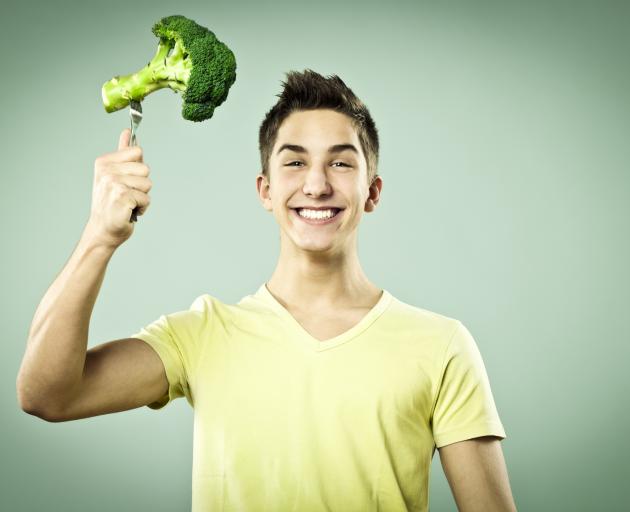
The point at which your offspring start campaigning for more vegetables should be a moment of quiet triumph. But there are things to consider, writes Kirsty Fairbairn.

Young people, by definition almost, want to try new things; to be independent and different. They are also often quite passionately empathetic with nature and the planet, which is a wonderful thing!
So when your teen announces one day that they want to "go vegetarian", what is your first reaction? Do you panic? Do you ask them "why?". Do you worry that this is some kind of new dieting tactic they are throwing at you now? Or the latest trend that you are going to be forced to indulge? These are all quite natural responses from parents.
The reasons for choosing a vegetarian diet are many and varied; including health, religious and environmental considerations, animal welfare concerns, taste, and beliefs about the nutritional quality of, and sustainability of, animal foods. Following a vegetarian diet can have a practical implication for how dinners are cooked in your household, if half of you want to eat meat and half of you don’t. However, it could also be quite important to your teen, and an opportunity for them to gain some independence in their decision making that is, thankfully, in a fairly safe context.
There are a few variations on a vegetarian diet, so it is worth probing what foods it is exactly that your teen wants to omit from their diet. Generally, vegetarian eating means avoiding meat in all forms; red meat, poultry (such as chicken, turkey and duck), pork, game meats, fish and seafood, while often still consuming dairy products like milk, yoghurt and cheeses, and eggs. Many still occasionally eat chicken or fish or seafood on a generally vegetarian diet.
A vegan diet entails consuming no animal foods at all, so that also means avoiding dairy foods, eggs and sometimes also other animal products such as honey and gelatin.
Given the fairly high energy, protein and nutrient needs of growing youth, it is useful for them to continue to consume calcium-rich dairy foods and eggs as great sources of protein and vitamin B12 in a vegetarian diet. Careful attention also needs to be paid to iron and zinc intakes.
Plant foods contain iron, but the form of iron (non-haem iron) present in plant foods is not as readily absorbed into the body as the haem iron found in meat. It becomes really important to ensure that good sources of vitamin C are present in each meal, as vitamin C enhances the absorption of iron from plant foods. It is also a good idea to avoid coffee and tea beverages while eating the three main meals (have them between meals preferably) as the polyphenols in them can bind the iron present in those meals, making it less accessible to the body. Phytates in cereals can also inhibit iron absorption, however, those foods with phytates often also contain iron, so ensuring that fruit or vegetables as vitamin C sources are included helps optimise the iron absorption from those meals.
If your child is keen to eat a vegan diet, personally I would suggest that they wait until they have finished growing and have settled into a nutrient-dense vegetarian diet for a few years (including mastering their own food preparation), before considering a vegan diet as an adult. Of course, vegan families may have the cooking skills and wide variety of foods already being consumed in their family to ensure a healthy growing vegan adolescent, but that style of eating benefits from a strong support network.
Eating more plant foods is a fantastic move for anyone to enhance their health. Eating wholegrains has been consistently linked with lowered risk of heart and cardiovascular disease and cancers, particularly wholegrain bread, breakfast cereals and bran. As I wrote about last month, eating more legumes (chickpeas, lentils, soy and beans) provides a fantastic source of resistant starch to boost gut health. Eating fruit and vegetables at least three times a day (compared to eating them less than once per day) was associated with a 27% lower risk of sustaining a stroke, a 42% lower risk of dying from a stroke, and 24-27% lower risk of dying from cardiovascular disease in a study involving more than 9000 American adults.
A young person’s growing body requires plenty of nutrients, and in the typical western diet they can be sadly lacking. Replacing the protein from meat sources with vegetable protein sources at each of the three main meals (and possibly also in snacks between meals) is important.
The accompanying table gives examples of protein containing plant foods. Many plant foods are missing one or two essential amino acids (protein building blocks that we need from our diet, as we cannot make them in our body ourselves). Animal protein sources tend to contain all essential amino acids in one place, so with a vegetarian diet we need to be a bit more skilled at mixing plant food protein sources over the day, ensuring that we don’t rely on one plant protein source.
However, it is not only protein that is necessary to help them grow. It is important that they also consume enough energy. A busy growing adolescent following a vegetarian diet will be consuming a lot of fibre (which is a great thing!) but they can fill up quickly on a high-fibre diet. They will need to be proactive to ensure that they eat enough food in their day to meet their energy, protein and nutrient needs.
Thus, it’s not a choice to be taken lightly, but it is one that you can support in your child. They also need to go into this style of eating with their eyes wide open. It is more ecologically sustainable to consume more plant foods, but does require some organisation and effort to ensure such a diet is nutritionally complete.
If you are unsure, it is always worth consulting a dietitian to check the nutrient content of your child’s diet. We will always support consuming plenty of plant foods!
- Dr Kirsty Fairbairn is a health, wellness and sports dietitian at Invigorate Nutrition (www.invigoratenutrition.com), based at Eclipse Health, Wellness and Performance, Hanover St, Dunedin.
Follow Kirsty on Facebook (InvigorateNutritionDietitian) or Twitter/Instagram: @KFSportsNut.












